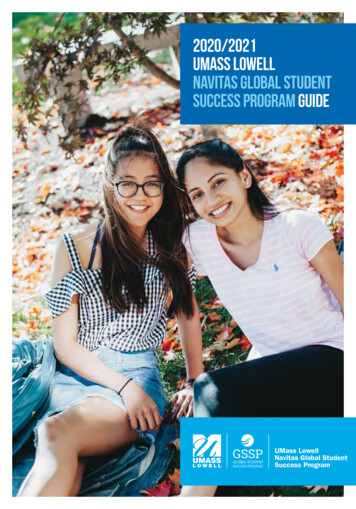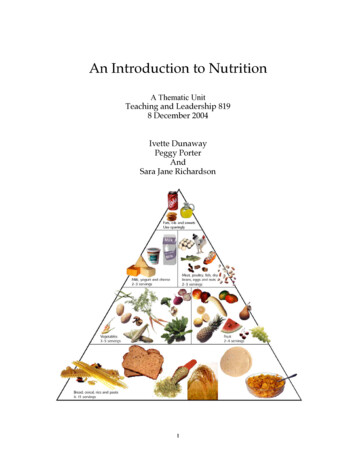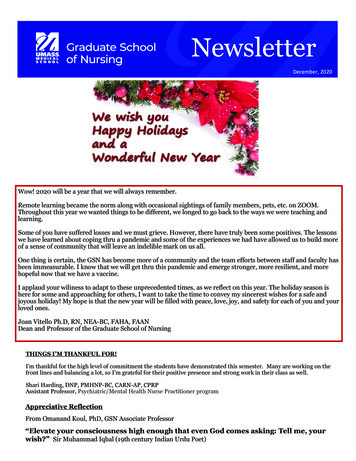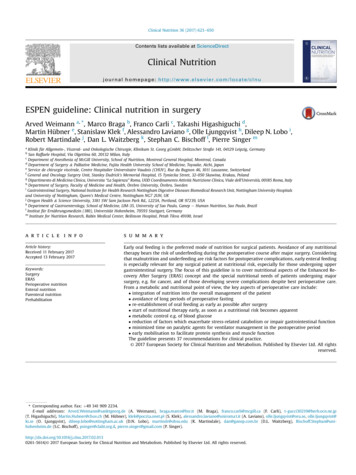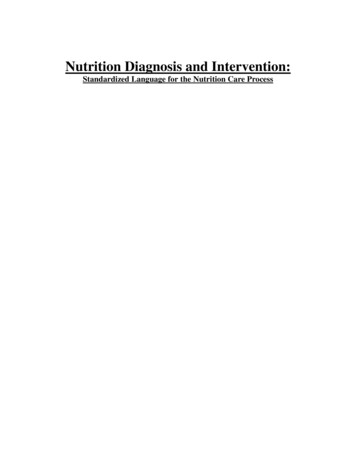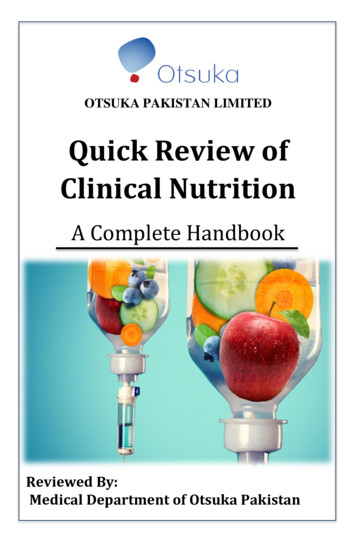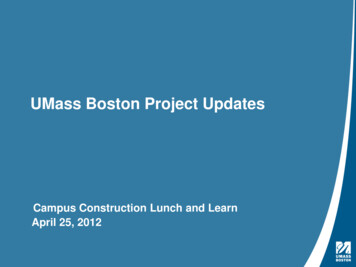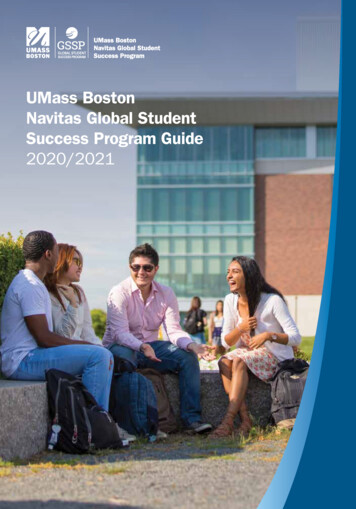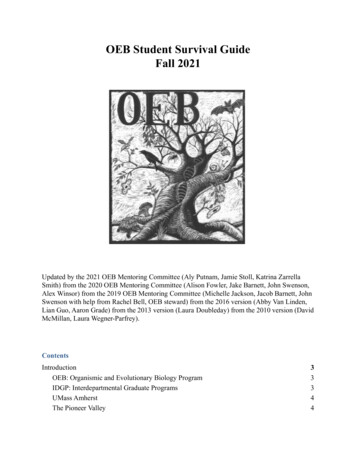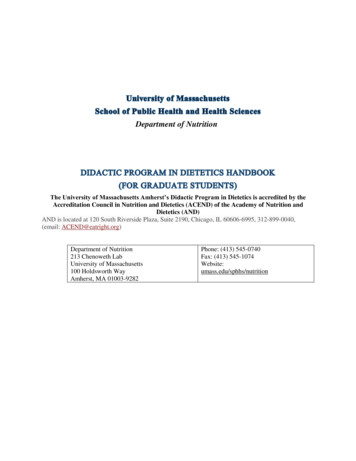
Transcription
Department of NutritionThe University of Massachusetts Amherst’s Didactic Program in Dietetics is accredited by theAccreditation Council in Nutrition and Dietetics (ACEND) of the Academy of Nutrition andDietetics (AND)AND is located at 120 South Riverside Plaza, Suite 2190, Chicago, IL 60606-6995, 312-899-0040,(email: ACEND@eatright.org)Department of Nutrition213 Chenoweth LabUniversity of Massachusetts100 Holdsworth WayAmherst, MA 01003-9282Phone: (413) 545-0740Fax: (413) 545-1074Website:umass.edu/sphhs/nutrition
Welcome to the Department of Nutrition at University of Massachusetts Amherst (UMass) Graduate DPDhandbook. I hope you find it useful. This handbook is intended to provide the necessary information andguidelines for students interested in earning the DPD Verification Statement. Registered Dietitian (RDN).As graduate students pursuing the DPD you will receive the Verification Statement under the requirements ofthe undergraduate Dietetics track with adjustments made for undergraduate courses that you do not take.Although I do not teach you directly, I would like to meet with each of you during the course of your time atUMass to provide guidance on DPD requirements and applying to a Dietetic Internship.Claire Norton, MS, RDDidactic Program in Dietetics (DPD) Director and Undergraduate Program Directorcpnorton@nutrition.umass.edu(413) 545-10772
The Department of Nutrition at the University of Massachusetts Amherst is among the most comprehensivenutrition departments in New England and has an outstanding record in teaching, research, and community service.The award-winning faculty at this department are dedicated to excellence in education. Online learning is availablefor students and professionals nationally and internationally through UMassONE.What is Nutrition?Nutrition is the science that focuses upon the nutrients contained in foods; their actions, interactions, and balancein relation to health and disease; and the processes by which an individual ingests, digests, absorbs, transports,utilizes and excretes nutrients. In addition, the study of nutrition is concerned with the social, economic, cultural,and psychological implications of food and eating.If you want a career that is exciting, challenging, and allows you to succeed, excel, and feel good about what youdo, then consider the field of nutrition. Nutrition is a vital, growing field open to creativity and opportunity—andthe possibilities are endless.What can I do with the RDN Credential?Once you are a fully qualified dietitian you may work in a position in which you provide medical nutritiontherapy to patients in a hospital or specialty clinic. Dietitians are also employed as consultants and managers offoodservice operations in health care or other institutional and commercial settings. They work in schoolnutrition as well as community nutrition programs to educate the public. Dietitians are active in the health andwellness industry and in corporate wellness where they address health promotion and chronic diseaseprevention. Dietitians also work in national, international and state government agencies for public healthprograms such as Women Infants and Children (WIC) and the Supplemental Nutrition Assistance ProgramEducation (SNAP-ED). They contribute to public policy in agencies such as the USDA and FDA. A growingnumber of RDNs work in private practice or as entrepreneurs providing nutrition products and services toconsumers. They write books, articles and newsletters. The link below will bring you to a video for the publicabout what a dietitian can do for you:https://www.eatright.org/? ga 43914The Department of Nutrition at the University of MassachusettsThe Nutrition Department is housed in the School of Public Health and Health Sciences (SPHHS).Admission to the University of Massachusetts Graduate School is described athttps://www.umass.edu/graduate/applyUMass Amherst Graduate Admissions is committed to the responsibility of providing access and opportunitiesfor all, while actively upholding diversity as a priority, demonstrating our commitment to inclusion ofhistorically underrepresented communities. We believe that a multicultural and diverse campus is essential toachieving academic excellence, allowing students of all identities and backgrounds to thrive at UMass Amherst.Assessment of Prior LearningEach graduate student will be able to use prior learning to meet the requirements of the UMass Amherst DPD ifappropriate. The DPD director will assess these courses to see if they meet the requirements of the DPDCourse of StudyThe course of graduate study for the MS in nutrition at UMass is expected to take two years (four semesters) tocomplete. Students can access their own student file through their UMass Spire account.3
Online classesAll current students in the School of Public Health and Health Sciences have the option to take some of theircourses with the University Without Walls (UWW). UWW courses are offered in spring, summer, fall, andwinter terms and are eligible for financial aid, but the cost of taking a UWW course is different from campusbased courses and may be higher, or may not be covered by your particular form of aid. Before you enroll in anyUWW course/s, it is highly recommended that you contact Financial Aid to ensure your current aid packageallows UWW courses.For more information, please go to the SPHHS undergraduate online course information page:The University Without Walls (UWW) program is firmly committed to ensuring the integrity of its distanceeducation and degree programs. All distance education students must use their university-issued credentials tolog in to Blackboard, through which all course materials and assessments are provided. SPHHS stronglyencourages faculty to incorporate randomized question pools for graded online assessments. Further,assessments may utilize other identity-verification technologies, including dedicated IP addresses, synchronousobservation tools, and 3rd party proctoring solutions integrated in Blackboard. Faculty have access toantiplagiarism tools (TurnItIn and Safe Assign) via Blackboard. Students’ access to Blackboard and all postedcontent is recorded and can be monitored and saved in accordance with university policies. All faculty teachingin distance education programs have access to course design/redesign services provided by the Center forTeaching and Learning and the Instructional Media Lab to assist with ensuring academic honesty throughinnovative teaching methods and technologies. For more information on UWW and SPHHS classes please gothe following s/undergraduate-uww-coursesAcademic SupportThe undergraduate program at UMass has robust support services that we strongly encourage all our students touse. In fact, students earning good grades typically are the students who use these services er resources for Students at UMassUniversity Health Services (UHS)University Health Services provides comprehensive medical care to a diverse population of UMass Amherstconstituents and promote campus health in the broadest sense. They are committed to the holistic integration ofa multitude of campus services promoting health in educational and residential environments. We emphasizestudents first, and strive for excellence, sustainability and efficiency. In addition to general medicine andprimary UHS provides the UMass campus community with a wide variety of specialty services includingpharmacy, laboratory, radiology on site. Students can access specialty services that include eye care,acupuncture, physical therapy, women’s health, transgender care, nutrition and more.https://www.umass.edu/uhs/The Center for Counseling and Psychological Health (CCPH) offers a community of care to UMass Amherststudents to help cope with stress or anxiety, find strategies to overcome challenges, promote mental wellbeing,and succeed in college life and beyond. The list below shows the breadth of services available to students. Theservices on list below can be accessed from the CCPH website:https://www.umass.edu/counseling/CRISIS SERVICES On-call clinician available 24 hours per day, 7 days a week, 365 days a yearLET’S TALK Confidential sessions with counselor-consultants4
GROUPS AND WORKSHOPS Skill building and support for undergraduate and graduate studentsINDIVIDUAL THERAPY Individual therapy at CCPH Off campus mental health servicesPSYCHIATRIC / MEDICATION SERVICES Psychiatric consultation Transitioning mental health care to collegeSPECIALTY SERVICES Assessment for ADHD and learning disorders Eating disorder consultation Sexual assault services Substance abuse Mind/body medicineRESOURCES FOR STUDENTS OF COLOR Includes helpful links, provider directories, self-guided and app resources, crisis numbers, and therapy fundsADDITIONAL RESOURCES Recommended wellbeing apps Other online resources Campus resources For UMass parents and families Mindfulness at UMass Community/off campus resources National resources Managing COVID-19 concernsNutrition FacultyThe faculty of the Nutrition Department carry out research in a wide variety of topics. Some faculty are alsoengaged in clinical practice in the field of dietetics. Details of the faculty are listed below.Faculty MemberElena T. CarboneProfessorAssociate Dean for Curriculum and Oversight,Commonwealth Honors CollegeDrPH, UNC (Chapel Hill), 1999Phone: 413-545-1071Email: ecarbone@nutrition.umass.eduResearch InterestsNutrition and behavior changeNutrition educationDistance educationSoonkyu ChungAssociate ProfessorPhD, UNC (Greensboro), 2006Phone: 413-545-1079Email: soonkyuchung@umass.eduFat cell metabolismLorraine CordeiroAssociate Professor and Director of theCenter for Research on FamiliesPhD, Tufts, Boston, MA, 2007Phone: 413-545-9071Email: lcordeiro@nutrition.umass.eduFood securityMulticultural nutritionAdolescent nutrition5
Nicole GoldsteinLecturer, Undergraduate Program AdvisorMS, UMass AmherstPhone: 413-545-1078Email: nicolegoldst@nutrition.umass.eduNutrition communicationYoung-Cheul KimProfessorPhD, Knoxville, TN, 1995Phone: 413-577-4553Email: yckim@nutrition.umass.eduNutrition and gene expressionFat cell metabolismZhenhua LiuAssociate ProfessorPhD, Auburn University, AL, 2003Phone: 413-545-1075Email: zliu@nutrition.umass.eduMicronutrients (Folate and Vitamin D),Nutritional Epigenetics, Obesity andInflammation, Gastrointestinal Health, CancerPreventionSarah Gonzalez-NahmAssistant ProfessorPhD, RD University of North Carolina ChapelHill, NC, 2016Email: snahm@umass.eduMaternal and child nutrition, health equity,obesityChristy MaxwellLecturer, Dietetic Internship DirectorPhD, RDN, RD University of MassachusettsAmherst, MA, 2018Email: cmaxwell@nutrition.umass.eduClinical DieteticsClaire NortonSenior Lecturer, DPD Director,and Undergraduate Program DirectorMS, Trinity College, Dublin, 1984Phone: 413-545-1077Email: cpnorton@nutrition.umass.eduClinical DieteticsEating disordersLindiwe SibekoAssociate Professor, Extension facultyPhD, McGill University, Canada, 2008Phone: 413-545-1693Email: lsibeko@nutrition.umass.eduMaternal and Child Health in racial/ethnicminorities and low-income populations,Breastfeeding & Lactation/Human Milk,Community-Based research, Prevention ofChildhood ObesityLisa M. TroyAssociate Professor and Honors DirectorPhD, Tufts, Boston, MA, 2007Phone: 413-545-4238Email: lisatroy@nutritin.umass.eduDiet quality measures, monitoring & evaluationHeather WemhoenerLecturer, Director of Online MPH in NutritionClinical Dietetics6
MS, RDN University of Massachusetts Amherst,MA, 2012Email: hmorin@umass.eduFor further information about the department, go to its website at www.umass.edu/sphhs/nutritionThe site contains an updated listing of news and events as well as an overview of the Nutrition Department7
DPD Requirements for Graduate StudentsThe Dietetics Track at the University of Massachusetts is accredited with ACEND (ACEND@eatright.org) andis the UMass, Amherst Didactic Program in Dietetics. (NOTE: ACEND is the accreditation arm of theAcademy of Nutrition and Dietetics (AND). AND is located at 120 South Riverside Plaza, Suite 2190, Chicago,IL 60606-6995, 312-899-0040, (web: ACEND@eatright.org). The requirements of the graduate studentspursuing the DPD Verification Statement mostly overlap with the Undergraduate DPD requirements. Wherethere is not an overlap for an ACEND learning outcome, graduate students complete these independently.Courses (or equivalent) Requirement for the DPD Verification StatementChemistry (two semester with lab)Introductory Biology (one semester)Organic Chemistry (one semester)Biochemistry (one semester)Human Physiology (one semester)Psychology, sociology or anthropology (one semester)BIOSTATS 540 (required for graduate degree)Nutrition 230 Basic NutritionNutrition 210 Scientific Principles of FoodNutrition 352 Nutrition in the LifecycleNutrition 430 Nutrition & Metabolism or 630Nutrition 572 Community NutritionNutrition 580* Medical Nutrition TherapyNutrition 597M* Special Topics in in Medical Nutrition TherapyMGT 301 Principles of Management or other introductory management classPersonnel Management (such as MGT 314 Personnel Management or HTM 260 Hospitality PersonnelManagement)Food Service Systems Management (HTM 250 Food Service Management)DPD Competencies checklist for Graduate students (in the undergraduate Dietetic track theseKDRNs are covered by course work in classes that graduate students do not take Sample of writing for the public. Please print and place in my mailbox. PowerPoint pdf. for professional audience (as handout 6 slides per page) – please use your PowerPointfor Nutrition 793. Abstract for professional audience. Please use your abstract for Nutrition 793. Evidence Analysis Worksheet. Please read the instructions on this assignment. Summary of Scope of Practice. Please read the article on the Grad Student DPD Moodle page.Complete the assignment. Mentoring Worksheet.Please read the articles on the Grad Student DPD Moodle page. Complete the assignment. Public Policy WorksheetPlease the instructions on how to complete the Policy assignment. Complete the assignment. Health Policy Assignment. Please read the instruction on the Graduate DPD Moodle page andcomplete the assignment.When all assignments are completed please put them in a Zip file and send them to me.*Nutrition 580 and 597M are taken together and are only offered in the fall8
Upon completion of the DPD, achieved by finishing all the requirements above, students will receive the DPDVerification Statement. The DPD Verification Statement shows that students have successfully completed thecourses needed to achieve the student learning outcomes and competencies set by Accreditation Council for theEducation of Nutritionists and Dietitians (ACEND). The DPD Verification Statement is needed to apply to aSupervised Practice or Dietetic Internship. Registration also requires passing a national RegistrationExamination. The Verification Statement shows that a student has achieved the academic standards in a programthat meets the administrative standards of ACEND. ACEND sets out learning objectives that all students mustshow mastery of in order to earn the Verification Statement. Academic programs wishing to educate futuredietitians must meet rigorous administrative standards that demonstrate that our students are successful in theapplication process to Dietetic Internships and in the RDN exam. Upon graduation from the Dietetics track allstudents will receive an electronic copy of their Verification Statement.Effective January 1, 2024, the Commission on Dietetic Registration (CDR) will require a minimum of aMaster’s degree to be eligible to take the credentialing exam to become a registered dietitian/nutritionist (RDN).Approval to sit for the registration examination with a Bachelor’s degree requires that individuals havecompleted the DPD and Dietetic Internship (and so have met all eligibility requirements) before December 31,2023 at 12.00 midnight Central time. They must also have submitted the application for approval to take theexam into the CDR’s Registration Eligibility Processing System (REPS) before 12:00 midnight Central Time,December 31, 2023. If you miss this deadline, you will have to have a Master’s degree and completed 1200hours of supervised practice to be eligible to apply to take the exam. For more information about the newMaster’s degree requirement visit CDR website: https://www.cdrnet.org/graduatedegreeOr call 1 (800) 877-1600 Ext. 5500Acceptance into dietetics internships is very competitive with the recent national acceptance rate at about 61%.The acceptance rate for the UMass graduates who applied to dietetic internships has been over 80% of graduateswho apply, for the past three years. While at UMass DPD students are given guidance on how to work throughthe process of applying to a dietetic internship. Here is a brief summary of the process.Internship applications are typically submitted online to an application agency (DICAS). Application deadlinesare in mid-February for programs beginning in the summer or fall, or September for January start dates. Programsthat offer graduate degrees may differ. For the Spring application cycle (when most of our students apply) thedidactic program director holds several meetings to explain the application process in detail. Students may applyto as many programs as they choose. Selection is done largely by computer matching through an online matchingagency, D&D Digital (again, graduate programs may differ). Students register with D&D Digital in order toparticipate in the computer matching process, in which students rank the internships to which they are applyingin order of preference. Around the middle of April, applicants will receive notification of it and where they havebeen matched. Students can only be matched with one program. Acceptance of the position is required by aspecified date. Because of the competitive nature of DI applications, it is strongly recommended that studentsobtain nutrition related experience through extracurricular activities and work and volunteer experiences. It is alsorecommended that students have at least a 3.0 GPA in order to apply for a DI.(2012-2021)CaliforniaCal State PomonaUC Davis Medical CenterColoradoSt. Francis Colorado Springs1219
Tri-County Health Department in DenverConnecticutSt. Joseph’s HospitalUniversity of Connecticut CP MS programYaleDelawareUniversity of DelawareGeorgiaGeorgia Regents UniversitySouthern Regional Medical CenterIllinoisBradley UniversityIllinois State UniversityRush University Medical CenterIowaIowa State DistanceLouisianaTulane UniversityMarylandNational Institute of Health (NIH)University of Maryland College ParkMassachusettsBeth Israel Medical CenterBrigham and Women’s HospitalBoston University DI/MSMass General HospitalMount AuburnPriority Nutrition CareSimmons CollegeSodexo (New Bedford)South Shore Sodexo (Obesity)UMass AmherstUMass Amherst MPH DIUMass LowellWellness WorkdaysMinnesotaUniversity of MinnesotaNew HampshireKeene StateUniversity of New HampshireNew JerseyCollege of St. ElizabethRutgersNew YorkBronx VAHunter CollegeNew York PresbyterianSage CollegeSodexo (MNT)Stony Brook UniversityStony Brook University Distance171411111112117818426211331416133115231110
SUNY OneontaNorth CarolinaAramark (Fayetteville)Duke University HospitalMeredith CollegeOregonOregon Health and Science UniversityPuerto RicoPuerto Rico Department of Health Dietetic InternshipSouth CarolinaMedical University of South CarolinaTexasMichael E DeBakey VA Medical Center and master’s Program in HoustonVirginiaVirginia Commonwealth University Health SystemWisconsinThe University of Wisconsin Green BayViterbo University WisconsinWashingtonBastyr111211112111Distance ProgramsAramark Distance Learning Internship (1)Sodexo Distance Dietetic Internship (3)The Didactic Program in Dietetics Mission, Goals and ObjectivesThe Didactic Program in Dietetics has developed a mission statement as well as goals and objectives for itsgraduates.Mission Statement of the DPD Program. The mission of the DPD program of the University of Massachusettsis “to provide quality teaching and a good scientific foundation to students, thereby enabling them to be successfulin accredited dietetic internship programs or professional careers.”Goals and Outcome Objectives of the DPD Program.Program Goal 1: To prepare graduates for careers in dietetics, dietetics internships, and successfulcompletion of the dietetic registration examination.Standard 3.3 Program Objectives related to Goal 1 (2017-2022):1. At least “80% of students who are enrolled in the dietetics track as juniors will complete the programwithin three years of that time.”2. . At least “60 % of program graduates apply for admission to a supervised practice program prior toor within 12 months of graduation.”3. At least “50% of program graduates are admitted to a supervised practice program prior to or within12 months of graduation.”4. “The program’s one-year pass rate (graduates who pass the registration exam within one year of firstattempt) on the CDR credentialing exam for dietitian nutritionists is at least 80%.”5. At least 80% of dietetic internship directors rate at least a four on a five-point scale that UMassstudents came into the internship with an adequate level of knowledge competence appropriate for asupervised practice program*Program Goal 2: To educate graduates who will reflect current nutrition science in their professionalpractice by providing a strong understanding of the scientific basis of the study of nutrition and dietetics.11
Outcome Measures related to Goal 2 (2017-2022):1. Eighty percent of dietetic directors rate at least a four on a five-point scale indicating that UMassgraduates have a strong understanding of the scientific basis of dietetics practice.**2.Sixty percent of seniors will rate at least a 4 on a 5-point scale that they received a strongunderstanding of the scientific basis for the study of dietetics in their course work at University ofMassachusetts3. Sixty percent of graduates will rate at least four on a five-point scale that they received a strongunderstanding of the scientific basis for the study of dietetics in their course work at University ofMassachusetts.Currently, the dietetics program at UMass has met or exceeded all benchmarks. For data on these data pleasecontact the DPD director (cpnorton@umass.edu)The dietetics program is designed to meet the 2017 Commission on Accreditation for Dietetics EducationFoundation Knowledge Requirements and Learning Objectives for dietetics programs. These requirements andobjectives are:1) Scientific and Evidence Base of Practice: integration of scientific information and research intopractice.2) Professional Practice Expectations: beliefs, values, attitudes, and behaviors for the professionaldietitian level of practice.3) Clinical and Customer Services: development and delivery of information, products, and services toindividuals, groups, and populations.4) Practice Management and the Use of Resources: strategic application of principles of managementand systems in the provision of services to individuals and organizations.5) Support Knowledge: knowledge underlying the requirements specified aboveFor more information on how the UMass DPD program meets these ACEND Learning Objectives please contactthe DPD director (cpnorton@umass.edu )For more information about the Didactic Program in Dietetics at the University of Massachusetts Amherstincluding required courses and recommended course sequence, as well as other information on our informationwebpage: -programFor more information on the Academy of Nutrition and Dietetics and the dietetics profession, please visit theAND web site at www.eatright.org.Requirements for accreditation by the Accreditation Council for Education in Nutrition and Dietetics (ACEND),the accreditation arm of the Academy of Nutrition and Dietetics (ACEND@eatright.org), are described below:If a student is not satisfied with the outcome of complaints within UMass, ACEND has established a processfor reviewing complaints against accredited programs in order to fulfill its public responsibility for assuring thequality and integrity of the educational programs that it accredits. Any individual, for example, student, faculty,dietetics practitioner and/or member of the public may submit a complaint against any accredited program toACEND . However, the ACEND board does not intervene on behalf of individuals or act as a court of appealfor individuals in matters of admissions, appointment, promotion or dismissal of faculty or students. It acts onlyupon a signed allegation that the program may not be in compliance with the Accreditation Standards orpolicies. The complaint must be signed by the complainant. Anonymous complaints are not considered. Here isthe link to the information on the ACEND page regarding filing a complaint. On this page students will finddetails of the procedure and a link to the Complaint Investigation Form.12
r Important information about attending the University of Massachusetts:The cost of attending the University of Massachusetts Amherst can be found at the Bursar’s graduate-tuition-ratesGraduate Policies and ResourcesFor information on graduate student policies and resources on any academic question including but not limitedto (performance monitoring, retention and remediation procedures, disciplinary or termination procedures, filinga complaint, formal assessment, protection of student privacy and online classes) please contact your graduateadvisor, Dr. Liu (the Graduate Program Director) or refer to the Graduate Guidelines Document which isavailable at the following es/Nutrition%20Graduate%20Guidelines handbookAcademic CalendarThe University of Massachusetts Amherst follows the academic calendars approved by the Faculty Senate. Formore information and details on current or future calendars, please ademic-calendar13
14
15
Each graduate student will be able to use prior learning to meet the requirements of the UMass Amherst DPD if appropriate. The DPD director will assess these courses to see if they meet the requirements of the DPD Course of Study The course of graduate study for the MS in nutrition at UMass is expected to take two years (four semesters) to
